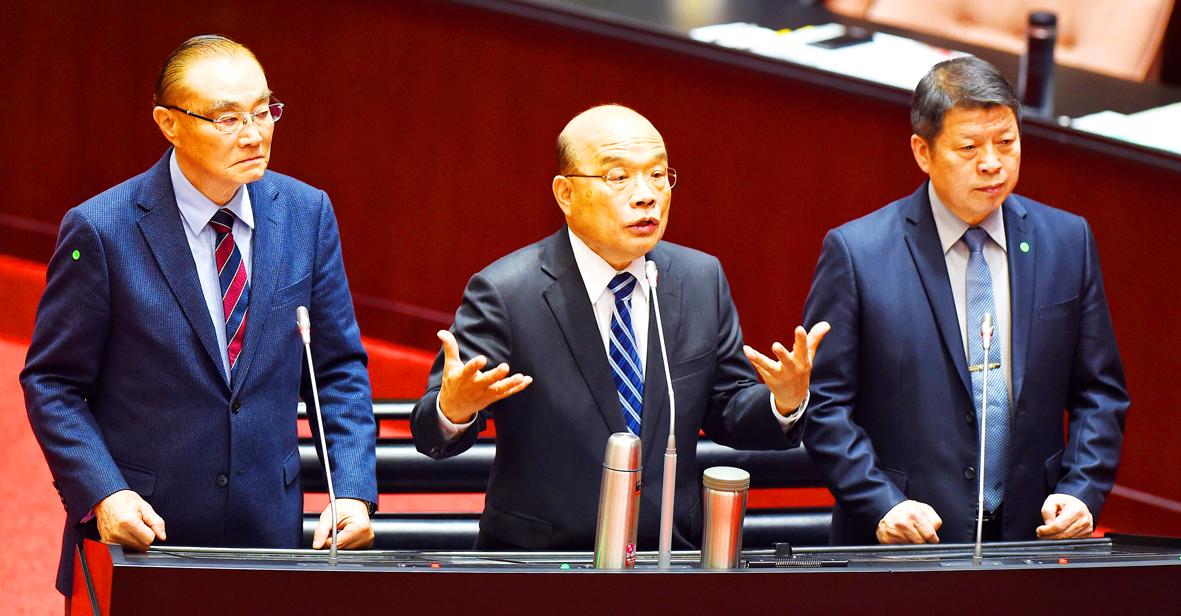Taiwan and China are two separate nations, and cross-strait exchanges can be beneficial and should not be completely cut off, Premier Su Tseng-chang (蘇貞昌) told lawmakers yesterday amid questions about the role of the Mainland Affairs Council and the impact of the COVID-19 pandemic.
Taiwan Statebuilding Party Legislator Chen Po-wei (陳柏惟) said COVID-19 has put the safety of Taiwanese at risk and could tarnish the nation’s reputation, as foreigners often confuse Chinese with Taiwanese “since they all have black hair and yellow skin.”
He asked Mainland Affairs Council Minister Chen Ming-tong (陳明通) what the council’s responsibilities were, adding that the council should not be promoting cross-strait exchanges, which China could use to assimilate Taiwanese.

Photo: Liu Hsin-de, Taipei Times
The council works to ensure that protocols for cross-strait exchanges are observed, the nation’s sovereignty is respected and the safety needs of Taiwanese are met, the minister said.
Chen Po-wei said that he supports Taiwanese doing business with Chinese, but is against “detrimental” exchanges, including Chinese “united front” tactics.
Chen Ming-tong said that the government should have faith in its people, who would be able to clearly see through exchanges which is the better government, Taipei or Beijing.
The whole world has seen that Taiwan has done a better job than Beijing in containing COVID-19, Chen Ming-tong said, adding that exchanges would allow the two sides of the Taiwan Strait to have more such competitions.
The premier said that with the world hailing the “Taiwan model” for containing COVID-19, foreigners discriminating against Taiwanese at this time are clearly unaware.
China is a large nation and market, from which Taiwanese have made profits, so as long as national security is ensured and the nation is not absorbed, he supports the two sides having mutually beneficial and respectful exchanges, Su said.
The government encourages people to compare China and Taiwan so that they can clearly see the face of communist rule, he said.
Chen Po-wei suggested the government implement “defensive democracy” by testing Chinese applying to visit Taiwan on their understanding of the Anti-infiltration Act (反滲透法) and the differences between the two nations’ political systems, just as the US government tests prospective immigrants.
Chen Ming-tong said he respected the idea, but the Legislative Yuan would need to pass laws to allow such a move.
Chen Po-wei suggested that Hong Kongers be allowed to serve as recruits in the Republic of China military, and they could boost the nation’s working-age population.
Hong Kong is a younger society than Taiwan, and its people hate the Chinese more than Taiwanese do, he said.
Su replied that the government cares deeply about the pro-democracy movement in Hong Kong, but recruiting Hong Kongers for the military would require prudence.

Taiwan has received more than US$70 million in royalties as of the end of last year from developing the F-16V jet as countries worldwide purchase or upgrade to this popular model, government and military officials said on Saturday. Taiwan funded the development of the F-16V jet and ended up the sole investor as other countries withdrew from the program. Now the F-16V is increasingly popular and countries must pay Taiwan a percentage in royalties when they purchase new F-16V aircraft or upgrade older F-16 models. The next five years are expected to be the peak for these royalties, with Taiwan potentially earning

POSITIVE DEVELOPMENT: Japan and the US are expected to hold in-depth discussions on Taiwan-related issues during the meeting next month, Japanese sources said The holding of a Japan-US leaders’ meeting ahead of US President Donald Trump’s visit to China is positive news for Taiwan, former Japan-Taiwan Exchange Association representative Hiroyasu Izumi said yesterday. After the Liberal Democratic Party’s landslide victory in Japan’s House of Representatives election, Japanese Prime Minister Sanae Takaichi is scheduled to visit the US next month, where she is to meet with Trump ahead of the US president’s planned visit to China from March 31 to April 2 for a meeting with Chinese President Xi Jinping (習近平). Japan and the US are expected to hold in-depth discussions on Taiwan-related issues during the

‘LIKE-MINDED PARTNER’: Tako van Popta said it would be inappropriate to delay signing the deal with Taiwan because of China, adding he would promote the issue Canadian senators have stressed Taiwan’s importance for international trade and expressed enthusiasm for ensuring the Taiwan-Canada trade cooperation framework agreement is implemented this year. Representative to Canada Harry Tseng (曾厚仁) in an interview with the Central News Agency (CNA) said he was increasingly uneasy about Ottawa’s delays in signing the agreement, especially as Ottawa has warmed toward Beijing. There are “no negotiations left. Not only [is it] initialed, we have three versions of the text ready: English, French and Mandarin,” Tseng said. “That tells you how close we are to the final signature.” Tseng said that he hoped Canadian Prime Minister Mark Carney

STAY IN YOUR LANE: As the US and Israel attack Iran, the ministry has warned China not to overstep by including Taiwanese citizens in its evacuation orders The Ministry of Foreign Affairs (MOFA) yesterday rebuked a statement by China’s embassy in Israel that it would evacuate Taiwanese holders of Chinese travel documents from Israel amid the latter’s escalating conflict with Iran. Tensions have risen across the Middle East in the wake of US and Israeli airstrikes on Iran beginning Saturday. China subsequently issued an evacuation notice for its citizens. In a news release, the Chinese embassy in Israel said holders of “Taiwan compatriot permits (台胞證)” issued to Taiwanese nationals by Chinese authorities for travel to China — could register for evacuation to Egypt. In Taipei, the ministry yesterday said Taiwan